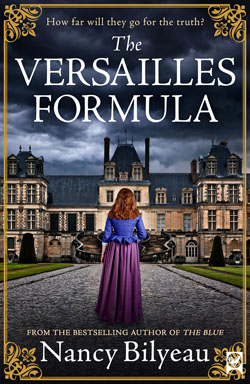 (Genevieve Planché was first introduced in The Blue, but you don’t need to have read The Blue or The Fugitive Colours to enjoy the third book in the Georgian mystery series, The Versailles Formula)
(Genevieve Planché was first introduced in The Blue, but you don’t need to have read The Blue or The Fugitive Colours to enjoy the third book in the Georgian mystery series, The Versailles Formula)
I thought when I settled in the countryside near Lichfield with my husband, Thomas, and our five-year-old son, Pierre, that my past would be buried. No more spying, no more intrigue, no more investigations into murder. And definitely no more putting myself in harm’s way.
So how exactly did I end up here, in Sir Horace Walpole’s Gothic mansion, hiding behind a suit of armor after midnight, and for the most fantastic of reasons? Namely, I am waiting to see if a ghost will appear.
I journeyed to Twickenham, a town near London, to help my closest friend, Evelyn, and planned a summer fortnight stay. But while there, I accepted the invitation to Sir Horace’s dinner party out of politeness… and curiosity. Why would the prime minister’s illustrious son include me, an obscure Huguenot painter, among his guests?
What was my first clue to why my presence was sought at this mansion, named Strawberry Hill? Sir Horace said he was in need of an artist’s eye. After a tour of the house–crammed with relics and curiosities from the medieval world—he planted me in front of a painting he purchased in Paris during his last visit. I recognized it as the work of Jean-Honore Fragonard, the celebrated French artist. The subject was an angel … but one with a strange smile.
At dinner, Sir Horace told a tableful of guests the full story: For more than a month, his household had been terrified by sightings of a ghost. A figure that looked like a golden-haired angel would race through the house, drawn to the same destination every night: the Fragonard painting in Walpole’s small, dimly lit armory.
For hours we debated whether ghosts existed, and whether one could be compelled to visit Sir Horace Walpole’s house. Instead of a spiritual sighting, was it a nasty prankster? Or, was the visitation motivated by darker reasons?
I was the one who suggested we hide in the house that very night and wait to see if the ghostly angel made its appearance. I must admit that after the wine and the excitement of conversation wore off, I felt more than a little foolish huddled in the armory, listening and watching. The house was still and quite dark.
Until I heard those three strange knocks on the wall, followed by a scampering of light feet up the main staircase of Strawberry Hill…
 The Versailles Formula: A Genevieve Planché Mystery, Book 3
The Versailles Formula: A Genevieve Planché Mystery, Book 3
Genre: Historical Mystery (1700s)
Release: April 2025
Format: Print, Digital
Purchase Link
She craved purpose. She found danger. Now, there may be no turning back.
Genevieve Sturbridge was never meant for a quiet life in the English countryside. Once an artist in the heart of London, now she spends her days in restless solitude, longing for the passion and purpose she once knew. But when a familiar figure from her past arrives with an urgent request, she is thrust into a perilous world of spies and a formula that could shift the balance of power between France and England.
The thrill of the chase is intoxicating—the cryptic clues hidden in plain sight, the challenge of ferreting secrets from dangerous opponents, the undeniable rush of being needed again. But with every step deeper into the mystery, the danger grows. Someone is watching. Someone is hunting. And the more she uncovers, the more she wonders: has she walked willingly into a trap?
This thrilling historical mystery, with its captivating plot of secrets, murder and espionage is perfect for fans of Irina Shapiro, Anna Lee Huber, Emily L. Finch, Kate Morton, Andrew Taylor and C.J. Sansom.
 About the author
About the author
Nancy Bilyeau worked as a magazine editor at Rolling Stone and Good Housekeeping before plunging into historical fiction. Her debut novel, The Crown, snared a positive review in Oprah magazine and was a finalist for the Crime Writer Association’s Historical Dagger Award. To create her Huguenot heroine, Genevieve Planché, Nancy drew on her own background—she is descended from Pierre Billiou, who emigrated to New Amsterdam (now New York City) in 1661. Visit her website at nancybilyeau.com.

This is one I want to read!